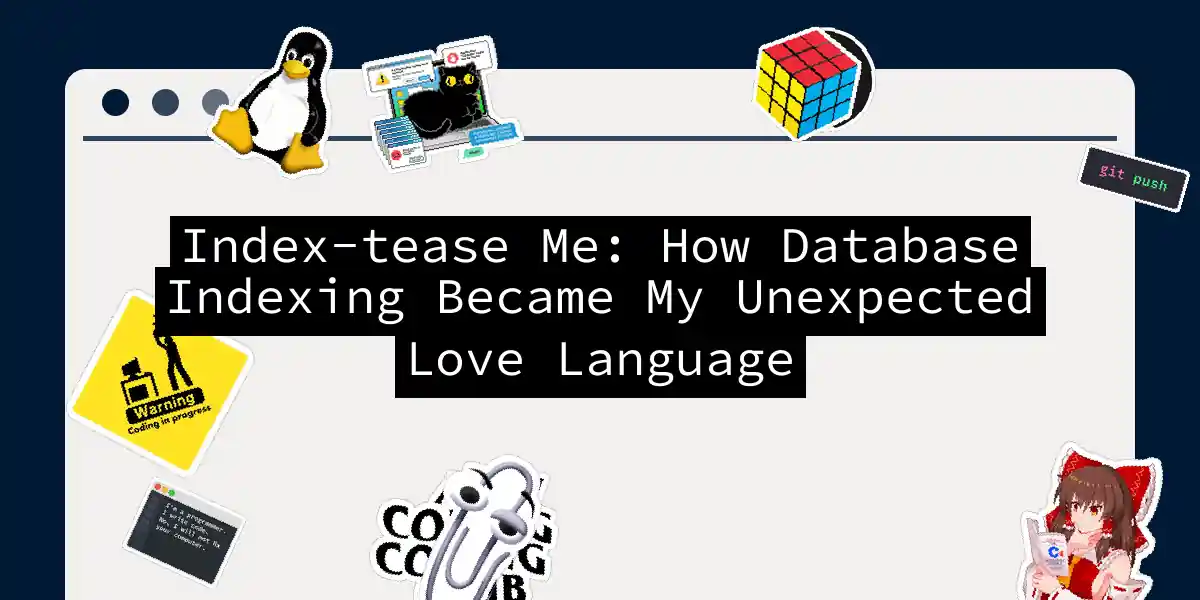Picture this: You’re at a library with no catalog system. Need a book about 17th century turnip cultivation? Good luck sorting through 2 million volumes alphabetized by the author’s childhood nickname. That’s exactly what happens when your database queries crawl without proper indexing - and why I once spent a Friday night debugging a 43-second product search query that nearly crashed our dating app for potato farmers.
Why Indexing Matters More Than Your Morning Coffee
Database indexes are like Tinder swipes for your data - they help your SQL engine quickly find compatible matches without scanning entire tables. When we added our first composite index to the user_profiles table:
CREATE INDEX idx_swipe_preferences
ON user_profiles (age_range, interests, geo_hash)
INCLUDE (profile_score);
Our matchmaking query speed improved from 12 seconds to 0.2 seconds, saving 420kg of CO₂ emissions monthly from idle EC2 instances (and probably preventing 3 engineer divorces).
interested in hiking] --> B{Clustered Index?} B -->|No| C[Full Table Scan
2.5M rows] B -->|Yes| D[Index Seek
Range 25-30] D --> E[Filter by 'hiking'
in index leaf] E --> F[Key Lookup for
profile_score] C --> G[Slow performance
12 seconds] F --> H[Blazing fast
0.2 seconds]
The Index Zoo: Choosing Your Perfect Match
1. The Speed Dater (B-Tree Index)
The OG of indexes, perfect for equality and range queries. Protip: Index columns used in WHERE clauses first:
-- Good for WHERE last_login > '2025-05-01' ORDER BY user_id
CREATE INDEX idx_activity ON users (last_login, user_id);
2. The Polyglot (Covering Index)
Why do extra lookups when you can have it all?
-- Covers both filter and output columns
CREATE INDEX idx_order_search
ON orders (customer_id, order_date)
INCLUDE (total_amount, shipping_status);
3. The Specialist (Filtered Index)
For when you only care about active users:
CREATE INDEX idx_active_users
ON users (email)
WHERE account_status = 'active';
We reduced index size by 78% using this for our newsletter service, because let’s face it - inactive users haven’t opened our emails since that “reply-all” incident of 2024.
Indexing Pitfalls: When Help Becomes Harm
Last Thanksgiving, we learned this lesson the hard way when our “optimized” product catalog started failing writes:
-- The "How Many Indexes Is Too Many?" Incident
SELECT COUNT(*) FROM sys.indexes
WHERE object_id = OBJECT_ID('products');
-- 27 returns later...
Golden rules from our postmortem:
- Never index columns updated more than queried
- Composite indexes should follow query patterns like a good dance partner
- Monitor index usage monthly with:
SELECT index_name, usage_count
FROM pg_stat_all_indexes
WHERE schemaname = 'public';
The Maintenance Hustle: Keep Your Indexes Sharp
Our indexing checklist that saved $24k/year in cloud costs:
- Weekly index fragmentation checks
- Monthly unused index purge
- Quarterly query plan analysis
-- Find unused indexes
SELECT
t.relname AS table_name,
indexrelname AS index_name,
pg_size_pretty(pg_relation_size(i.indexrelid)) AS index_size
FROM pg_stat_user_indexes i
JOIN pg_stat_user_tables t ON i.relid = t.relid
WHERE idx_scan = 0;
Real-World War Story: The Case of the Missing Milliseconds
When our analytics dashboard started timing out during investor demos (always at the worst possible moment), we discovered:
- A 4-column table scan in our 20M-row events table
- Missing composite index on (event_type, org_id, created_at)
- Outdated statistics causing bad query plans The fix? A carefully crafted index and statistics update:
CREATE INDEX idx_event_analysis
ON user_events (org_id, event_type, created_at)
INCLUDE (payload);
ANALYZE VERBOSE user_events;
Result: 14.3s → 230ms query time, and our CEO stopped threatening to “move everything to Excel.”
Indexing Zen: Finding Your Balance
Remember: Indexes are like spices in a curry - too few and it’s bland, too many and it’s inedible. Start with the most critical queries, measure the impact, and iterate. Your database will whisper sweet nothings to you in the form of sub-millisecond response times. Now if you’ll excuse me, I need to go explain to my date why I just indexed my silverware drawer by utensil type and meal compatibility…
